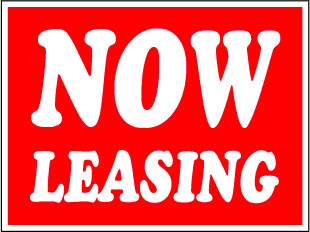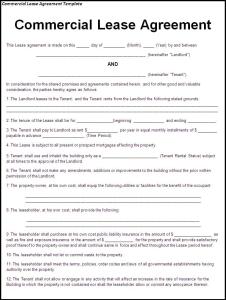A Lease for commercial space is vastly different than for (a house or apartment) residential. If you (the Lessee) have no experience or knowledge in this area than it might be very advantageous to work with a commercial real estate broker. A lease is a legal contract and once signed you will be fully obligated by its terms. On the positive side, the Lessor is also obligated. You may be negotiating the lease with someone other than the actual property owner. It could be a management or leasing company. It could also be a lessee that is now subleasing it to you in which case you will need to find out if they have the rights to do so.
The most important part of any lease is of course the amount of rent. Equally important is the term of the lease. If you are starting your pole business, you will want to keep the lease term to only a one or two year term. You do not want to be obligated to pay rent for several years if your business is unsuccessful and closes. It is possible in negotiations to build into the lease an option to renew. So as an example you might ask for a one year lease, with an option to renew for one or two years. The rent for the additional years will most likely include an increase. Through negotiations you will want to keep any increase minimal. You do not want surprises. If your business is successful, and you one day reach towards the end of the lease agreement, you will want to look for options. It is not unheard of when a new lease is offered that the lessor demands a large increase, possibly forcing you to relocate. So to restate you want to keep your initial commitment as short as possible though planning if your business is successful to remain without a significant increase in rent. When you receive the lease, you should consider bringing it to an experienced attorney that specializes in real estate.
The rental cost is normally per square foot. That is how to compare various locations even though they will be of different sizes. If the location has been empty for some time or is in need of some repair, they may offer a reduced rent. Conversely, if its in a very desirable, high traffic area, they might want a premium. the longer the term of the lease, the more negotiating you can do.
Look carefully for the amount of security that is needed. While there could be first & last month’s rent; it can include many other options increasing your startup costs. There may be an additional security deposit in addition to rent.
Within the lease will be specified who is responsible for what. There is no standard in this regard. Things like:
- Roof repairs
- Air Conditioning/Heating
- Parking area & Grounds maintenance
- Plumbing
- Electrical
- Outdoor Lighting
- Entrance
- Alarm Systems/Security
- Security Gates
 If you have a rainstorm and water leaks into your facility, you will need to know whether to call the landlord or a roofer. You may need to keep cut grass and pickup the parking area. In fact the lease may specify that if you do not maintain properly you have violated the lease agreement and be subject to penalties or possible eviction. There are also many different state laws also that may regulate these things and a real estate attorney can advise you when signing the lease. You need to know the specifics as these will effect the amount of expenses your business will encounter.
If you have a rainstorm and water leaks into your facility, you will need to know whether to call the landlord or a roofer. You may need to keep cut grass and pickup the parking area. In fact the lease may specify that if you do not maintain properly you have violated the lease agreement and be subject to penalties or possible eviction. There are also many different state laws also that may regulate these things and a real estate attorney can advise you when signing the lease. You need to know the specifics as these will effect the amount of expenses your business will encounter.
Some leases especially located in a shopping plaza will have a fee called a Common Area Maintenance fee. These can be monthly, quarterly or yearly. The CAM fee will cover the cost of maintaining areas shared by all tenants. Grass cutting, parking lot, outdoor lighting and possibly roofing. On occasion these fees can go to a group operated by the tenants themselves and not the lessor. It is also possible these fee amounts may be subject to change at intervals less than your lease agreement. You will want to confirm how the fees are calculated. Usually they are by the square footage that is leased although have seen them by number of units/storefronts rented or a percentage of rent amount. There are individual fees that also may be found in the lease.
The lease will spell out who is responsible for regular service expenses such as:
- Electric Service
- Water
- Sewer
- Heating
- Property Taxes
These expenses may be billed to you directly like most people have electrical service to their house. Each service may billed to the property owner for all tenants and split between each tenant. You will then want to know how that is calculated. The Lessee may charge tenants the property tax divided by each tenant, called a Net Lease. As property tax can be significant on commercial property, you will want to know if this is included in the monthly rent or additional.
A lease will detail that insurance be provided by you. You will need a proof of insurance delivered before occupying the space. The insurance normally needs to cover damage to the property/building itself and liability for injuries occurring on premises.They will tell you the amount of coverage they require. You will also want and need insurance covering the interior as well as the fixtures.
Some leases may have a limited hours of operation section. It may be specific hours of operation or mention abiding by the hours of operation for the facility. If your business will include late or early hours then you want to have that taken out if possible, have the hours specified changed or decide the lease will not suit your business.
The lease will specify what interior changes can be made. This will be in a section called “leasehold improvements.” Especially the basics like moving or adding walls. It can be as detailed as if changes are made are they kept permanent by the property owner or must be removed & repaired (to original condition) at the end of the lease. Mostly it is based on if the changes would be desirable for the next potential tenant. For a pole studio, that hardwood dance studio may not have value for a retail store so may need to be removed. If you are mounting poles for any purpose, will it be damage that is easily repaired? Often people fall into a trap of thinking a few small holes should not be an issue when they may be. You may want to add a section for expected changes to be acceptable by the lessor. It may also be the case where you add say an expensive bathroom vanity and it may have to be left at the end of the lease. It will also cover outdoors including signage. Do not take for granted that an outdoor sign used by the previous tenant is yours for the taking. The lease may specify the size and location of all signage. Discuss all of this before signing a lease to reduce later surprises.
There are several items that may not be in the lease as given to you but you may want them added in.
- Exclusivity. This is where the Lessor agrees not to rent space in the same complex or area to a business that may compete with your business. The lease should already have an area that defines how the space is to be used for your business. This is extremely important. Look at all the facets of your business. A pole dance studio that also focuses on fitness may not want a fitness center next door. This can also work in reverse if another tenant has an exclusivity that may keep you from a side of your business that competes. Without some sort of exclusivity clause, the property owner can lease to a direct competitor next door.
- Rehabilitation. In some cases the space being rented may be in poor condition that needs a number of repairs before a business could operate. If it is repairs you can perform, you may request a Rehabilitation clause to cover the cost of the repairs. This can be an allowance on the rent or an allowance & materials to be provided by the property owner. The benefit for you is building the space specifically to suit your purposes besides a break on the rent. Often the first thing a tenant does is redesign the space anyway. Consider carefully if the allowance and other benefits outweigh the expenses that will be encountered.
- Sublease. There are two instances where this can be important. If your business does not survive the lease period, this allows you to sublet the space to another business. If you have a three year lease and you close in the first year, this can ease the financial burden of the remaining time on the lease. You will have to play the part of the lessor but it can save you substantially. The second is if you find you have space unused. You may then want to either split or share space with another business. If you are a pole dance studio you may want to rent to a fitness or general dance business to share the space when you are not using it. Without a sublease clause you would be violating your lease.
- Bailout. Should there be some sort of disaster including a flood, tornado, drought, etc. that effects your facility, this allows you to bailout of your lease without penalty.
- Cotenancy. You may have rented space in a shopping plaza or center where the main form of traffic is a major store such as Sears, Target, etc. That store is the anchor store and should it close, move or change it will effect traffic around the shopping center. The cotenancy clause will allow you out of the lease to relocate. Some lessors will instead offer a reduction in rent for the period no anchor store exists.
It is your responsibility for all required licenses for operating your business from the location. There are also zoning laws which can come from federal, state, county or local ordinances. Never simply take the Lessor’s word for it. You are responsible and must perform the due diligence.
Lastly, it must be stressed again that if you have limited knowledge and/or experience with commercial leases we cannot recommend strongly enough working with a commercial real estate broker and retaining a real estate attorney.

